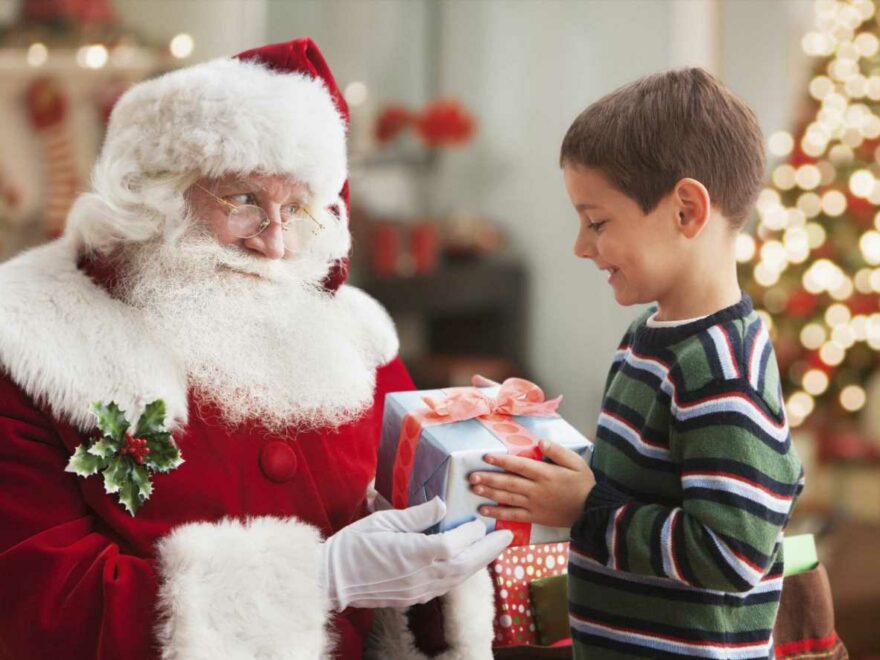A VISIT from Santa Claus is arguably the biggest joy for kids at Christmas time.
And for many, believing in the jolly man in red and his faithful pack of reindeer is what keeps the spirit of Christmas alive.
But what happens when your little ones begin to question the age-old festive tale? And what exactly SHOULD you tell them about the famous Father Christmas?
Is Santa's existence bad for kids?
Fabulous spoke to some experts who revealed that parents shouldn't worry aboutabout keeping the story of Santa alive – in fact, it's actually better for them.
Dr Julia Budnik Grantham, the author of the children’s book ‘A Mole Like No Other’, says: "I don’t think there's any problem with creating a Christmas story of your own making in your family.
FABULOUS BINGO: GET A £5 FREE BONUS WITH NO DEPOSIT REQUIRED
"Family traditions are crucial for early years development of a child, their importance can’t be underestimated.
"In my experience, I’ve never come across a child negatively affected by their childhood belief in Father Christmas. But I came across those who were told right from the start by their parents they weren't believers in Santa, and I watched the look of disappointment on their faces when they couldn’t share other children’s excitement during Christmas gatherings."
Most read in Fabulous
HEIR THIS The Queen will have 'formal' Xmas celebration with Harry & Meghan, expert claims
Nan blasted for not buying son's stepchild matching Christmas pyjamas
Frantic woman texts neighbours after spotting their living room is 'on fire'
Woman busts boyfriend when she sees photo of his hols – can you spot what’s wrong?
Julia explains that our little ones are "very well equipped and skilled in role play and fantasy" and they're often "much better than adults in separating truth from fiction."
Meanwhile, Nina Julia, founder and chief editor at CFAH who has a Master of Science in Early Childhood Education agrees, saying: "The great thing about Santa and why I chose to tell my children about him is because he plays a big part in making Christmas magical.
"For young children especially, the line between fantasy and reality is blurred which allows their imagination to run wild. Enabling this is very important in child development as it helps develop emotional, social, physical and problem-solving skills."
"Christmas also provides an opportunity to encourage empathy, kindness and generosity. The belief in Santa and the ‘naughty’ and ‘good’ list is a way to encourage kindness in your children and remind them that their actions have consequences in a positive manner."
What's more, the end of year celebration also provides an "opportunity to encourage empathy, kindness and generosity" Nina explains.
She adds: "The belief in Santa and the ‘naughty’ and ‘good’ list is a way to encourage kindness in your children and remind them that their actions have consequences in a positive manner."
When should parents tell their kids 'the truth'?
According to the experts, there isn't a right or wrong age to tell kids 'the truth' about Santa and we shouldn't have a set age in mind.
Instead, Dr Grantham and Nina say that we should "lookout for the cues from them" and have an honest chat when the time is right.
"I’d say the best way to handle it is to allow your child to start figuring it out for themselves."
As for using ages as a guide, Nina reckons around the age of 11 or 12 could be a good time to have the chat.
I do think it’s crucial to avoid lying to children, so if they start questioning his existence and demanding answers, it’s better, to be honest.
This is when they'll most likely start discussing it with their friends and questions might start to arise.
And when they do, Nina says: "Just make sure you’re ready to have the conversation when it inevitably comes up."
Dr Grantham says some kids might "guess the truth for themselves" between the ages of four and seven.
If this happens it's totally fine as they can still continue participating in all the Christmas fun.
Using 'Santa's not coming' as a threat
Kathryn Lord, who works as a nanny, advises against threatening misbehaving kids with Santa.
She says: "As someone who supports families to help with behaviour management in the home, I would say never use Santa not coming as a threat.
"The consequences for behaviour have to be something that you follow- up, you have to mean what you say and actually act upon it and young children (under 7) do not understand delayed consequences."
In more festive news, we revealed the best Christmas decorating hacks – from untangling fairy lights to keeping your tree from falling over
Plus the top loungewear looks for chilling on the sofa between Christmas and NY – prices start from just £14.
Also, the most stressful things about Christmas revealed – including buying gifts, pleasing people and lack of exercise.
Source: Read Full Article






